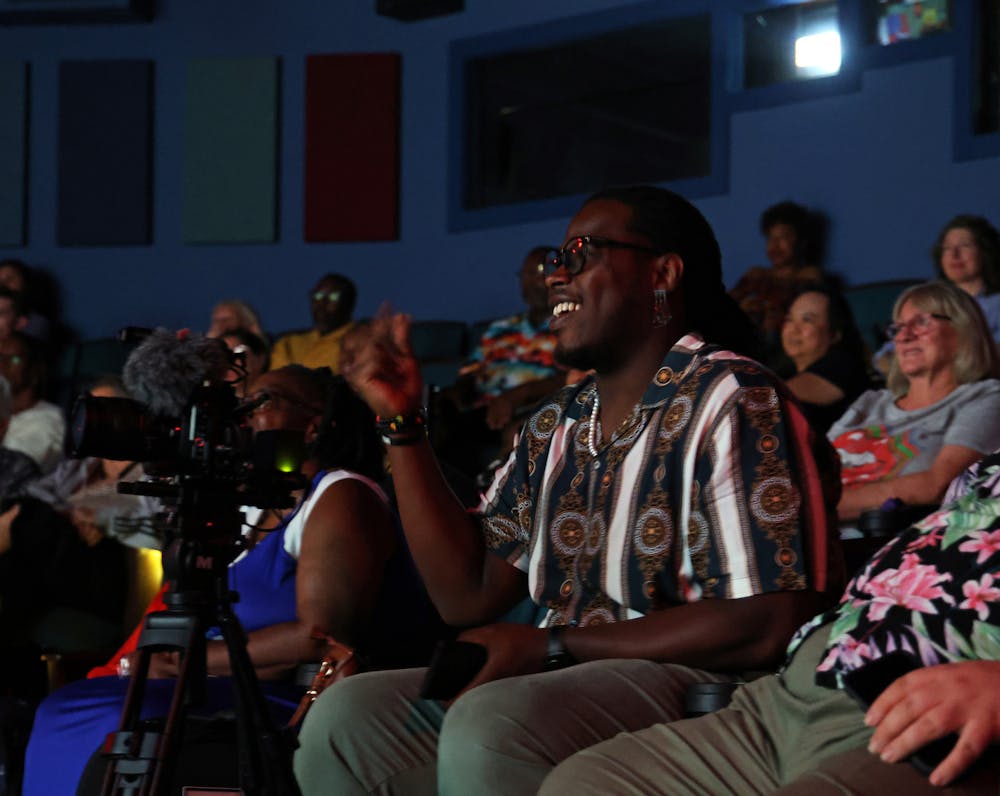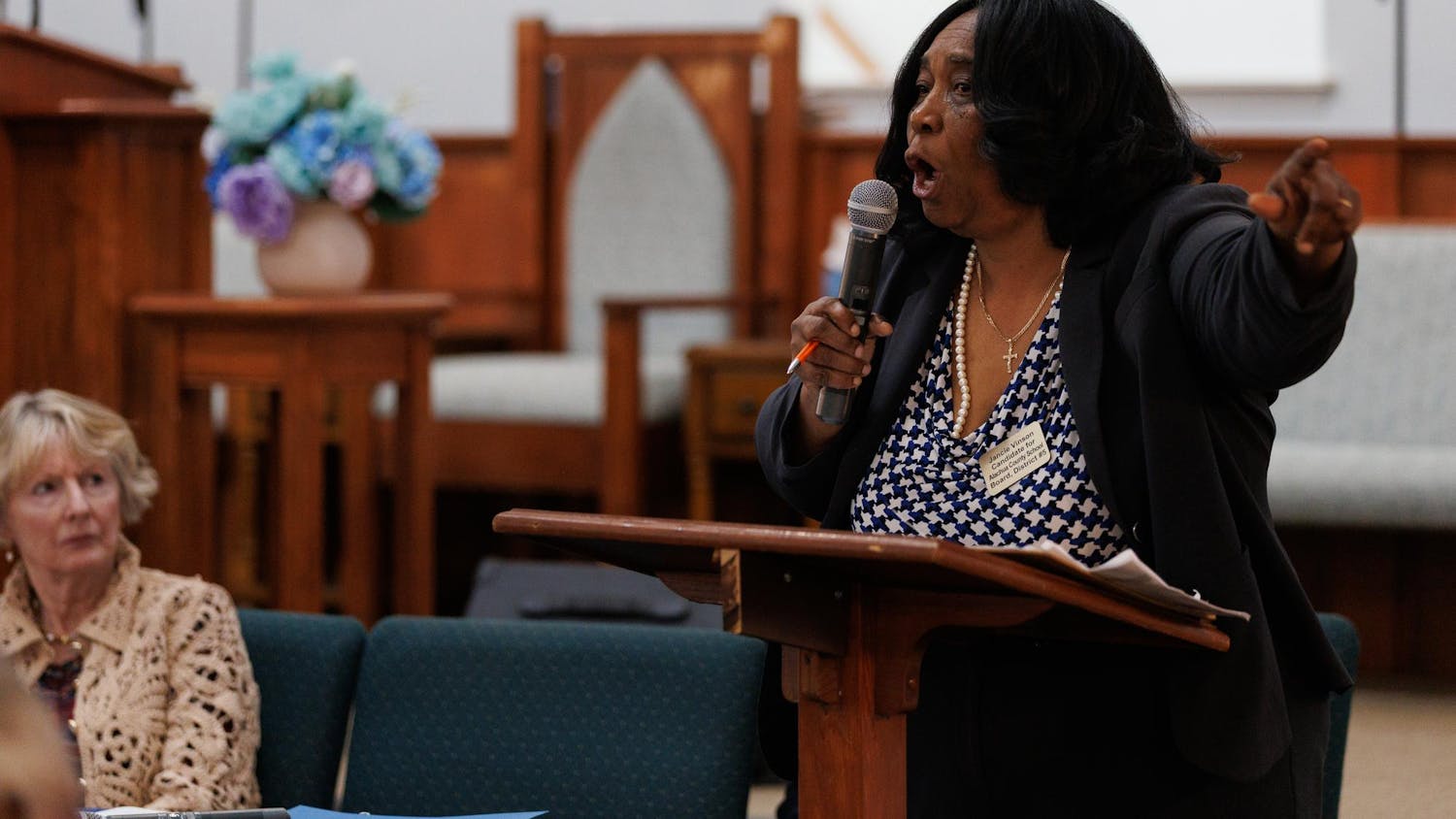Shortly before Michael Gengler graduated from Gainesville High School in 1962, he asked the student body if they were in favor of desegregation. With 38% responding “yes” and 62% responding “no,” he knew he had to try to preserve Gainesville’s rich community history — even if it would take him more than half his lifetime to do so.
At the Juneteenth Gainesville Film Festival on Saturday, the Hippodrome Cinema screened three films honoring emancipation and Black history. The night started at 6 p.m. with "When the Music Was Cheap and Darn Near Free,” an independent film produced by local author and women’s wellness advocate Terri Bailey.
Bailey’s documentary explores Gainesville’s history of Black musicians without shying away from the town’s devastating roots in the Rosewood Massacre. The racially motivated attack on the Black residents of Rosewood, Florida, is historically tied to Gainesville, where a Ku Klux Klan rally was held shortly before the mob attacked.
When the film mentioned the events, many of the audience members refused to look away from the screen, fiercely acknowledging their town’s past. Bailey’s documentary educated viewers about the Chitlin Circuit, a network of Black-owned music venues in Gainesville during the Jim Crow era, but consistently reminded them of how Black power emerged in the first place.
Following the first film was a documentary directed by Gengler called “Bridging Troubled Waters: The Life of Coach Jessie Heard,” which follows the last Black coach of Lincoln High School as he navigated the impacts of desegregation on his football team.
Gengler, an 81-year-old lawyer, author and filmmaker, spent decades researching at Harvard Law School for his 2018 book, “We Can Do It: A Community Takes on the Challenge of School Desegregation,” which the film is based on.
Throughout Gengler’s documentary, individuals hummed in affirmation while interviewees described the desegregation era. When the familiar anthem of Lincoln High School began playing near the end of the film, audience members sang along with pride.
After the viewing, Lex Shelton, a 34-year-old Gainesville resident, left the old-fashioned theater with a strong connection to Heard’s story, specifically his message of camaraderie in his football coaching.
“It’s not really Black [or] white, it’s just teammates,” Shelton quoted from the movie. “Even in today’s time, you can have such different political beliefs, such different views on life and everything, but you put on the same uniform, the same logo.”
During his time playing high school football 16 years ago, he experienced racism when playing in predominantly white communities.
A large number of local residents are unaware of Gainesville’s deep desegregation history, he said, which is where Gengler’s film comes into play. Educational media like the film allow wider audiences to learn about the city’s past.
Gengler’s documentary is based on 11 years of school board recordings, newspaper records, case files from the Alachua County desegregation case, and, at its heart, interviews of Black and white people reflecting on what life was like during that era.
His film tells the story of Coach Heard. From his humble beginnings in Jackson’s Gap, Alabama, to his induction into the Florida A&M University Sports Hall of Fame in 2004, Heard left a lasting impact on African American football before, during and after the segregation era.
After a knee injury stopped him from playing in the NFL, Heard began coaching football for Lincoln High School, where he was a pillar of the Black community in Gainesville. He led his players to outstanding accomplishments through his unconditional support. At one point, his team had over 100 players because he didn’t want to turn any of them away.
Two women in the first row of the theater looked at each other, smiled and glanced toward the opposite side of the room. Coach Heard sat there with a pensive expression as the film illuminated his features.
When Lincoln High School eventually closed in 1970 due to federal desegregation laws, Heard became the first head football coach at the desegregated Buchholz High School. There, he took in students from diverse backgrounds and taught them how to play as a team, regardless of who they were or where they came from.
The education system in Gainesville was extremely different for Black and white students, Gengler said. Black students attended Lincoln High School while white students attended Gainesville High School.
“We had a very good education, and we were segregated,” Gengler said. “Of course, the kids at Lincoln didn’t have anything like that. And [the superintendent] said, ‘The county spends all this money educating you smart kids and then you all go away and never come back.’”
After the conversation, he decided he would give back to his community when he had the chance. Gengler plans to donate $2.2 million to the UF College of Education in support of Alachua County teachers who plan to attend graduate school, he said.
David Ruiz, a 43-year-old volunteer on the Gainesville Cultural Affairs Board, also attested to the value of the three films. He promoted the Juneteenth Gainesville Film Festival and coordinated with sponsors to ensure it ran smoothly.
Showcasing historic African American stories through art is especially important because of the current political climate, Ruiz said.
“One of the people in the [Gengler] film said, ‘As a team, we didn’t experience what the broader community was dealing with when it came to segregation,’” Ruiz said. “That makes me hopeful that coming together and sharing one another’s perspective will help bridge and continue to bridge that divide, presently and going forward.”
The film festival ended with a screening of “Black Panther” at Bo Diddley Plaza. As Juneteenth approaches, celebrating Black history through media expression invites the Gainesville community to reflect on the impact of Heard’s life and the millions of individuals who paved the way for resilience before him.
The next part of the community celebration of Juneteenth, Honoring the Past, Living in the Present, Building for the Future, will be held at the Santa Fe College Blount Center on June 18.
Contact Autumn Johnstone at ajohnstone@alligator.org. Follow them on X @AutumnJ922.
Autumn Johnstone is a freshman journalism/art student and a music reporter for The Avenue. When they're not writing, you can find them enjoying a nice cup of coffee at a nearby café or thrifting for vinyls.






